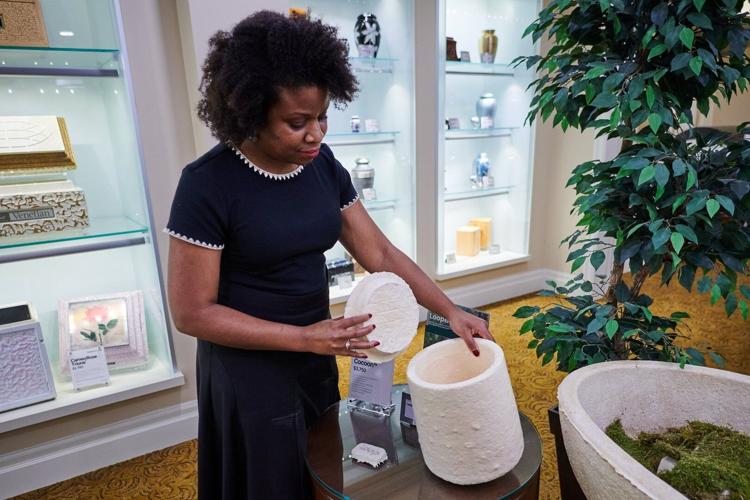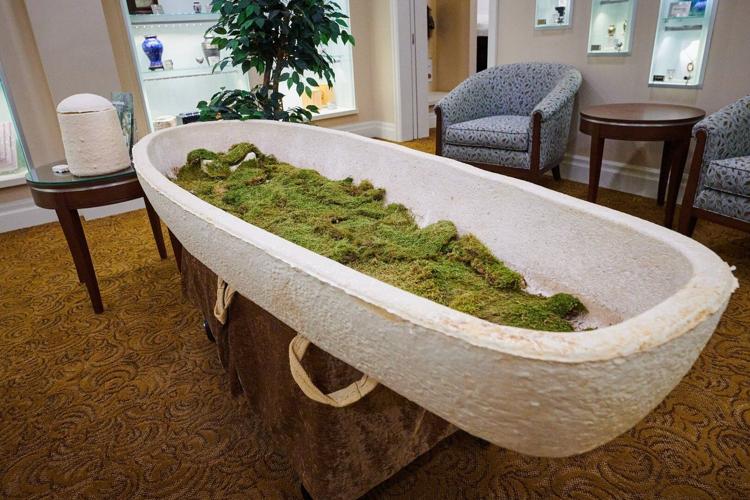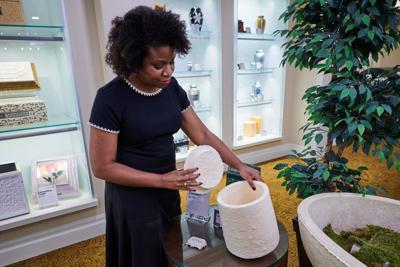TORONTO - As more people worry about their environmental footprint in both life and death, one cemetery operator is offering a unique alternative to traditional burials ŌĆō coffins and urns made of mushrooms.
Mount Pleasant Group, which provides funeral and cremation services in the Greater ║ŻĮŪ╔ńŪ°╣┘═°Area, says the fully biodegradable products from Dutch company Loop Biotech represent “a new era” in sustainable burials.
“It’s produced within seven days and it’s a product that is environmentally friendly, it’s totally 100 per cent natural,ŌĆØ said Angie Aquino, the company’s president of funeral services.
She said no wood, metals or chemicals are used to make the coffin named Living Cocoon or the urn called EarthRise, and ŌĆ£significantly less energyŌĆØ is used in the production process.
The products are made of only two natural ingredients: mushroom roots known as mycelium and hemp fibres, Aquino said.
ŌĆ£They’re blended together, and they’re placed into a mould, and that mould over a seven-day period will become firm and sturdy, and it then creates this,” she said in a phone interview.
Aquino said the mushroom casket biodegrades within 45 days of burial in ideal weather conditions and it can also be used in cremation.
Mount Pleasant Group says its consumer research has found that 50 per cent of people want eco-friendly funeral products, and 65 per cent believe funeral homes should offer those options to their clients.
The company has two natural burial sites ŌĆō one in Brampton and another in Pickering ŌĆō where bodies are buried in a way that has minimal environmental impact, without embalming or using traditional coffins.
The Green Burial Society of Canada says on its website that the country’s first urban natural burial site opened in Victoria, B.C., and “a growing number” of communities have since established green burial areas in existing cemeteries or standalone natural burial sites.
Juliette OŌĆÖKeeffe, a senior scientist at the National Collaborating Centre for Environmental Health, said she has also seen increased public interest in sustainable funeral options and environmentally-friendly ways to dispose of human remains ŌĆō the topic of one of her published papers.
She said she doesnŌĆÖt know much about mushroom-based burial products because they are still ŌĆ£quite novel,” but she came across the technology while she was doing her research.
ŌĆ£From my understanding the premise is it’s a natural material, so it’s made from natural sources like mushrooms, and it breaks down the contents of the urn or the coffin faster,ŌĆØ she said in an interview.
ŌĆ£It recycles that material better in the soil rather than something that is manufactured ŌĆ”that takes a long time to degrade in the environment and might contain chemicals.ŌĆØ
Abigail Brown, director of marketing, communications and outreach at Mount Pleasant Group, said the company decided to add the mushroom casket and urn to its list of offerings after it saw a growing interest in sustainable burials.
ŌĆ£It’s a wonderful option for people who want to be as thoughtful about sustainability and caring for the planet as they were when they were alive,” she said while standing next to the sarcophagus-like, cream-coloured mushroom casket with moss strewn inside it.
ŌĆ£The beautiful thing about what’s happening while they’re biodegrading in the ground is they’re returning nutrients to the soil, vital nutrients like phosphorus and nitrogen, which enrich the soil ŌĆ” they’re giving back to the earth,” Brown added.
OŌĆÖKeeffe said there are several options available to people interested in alternatives to cremation and traditional burials, which can have a significant impact on the environment.
Green, or natural, burials involve placing human remains in a biodegradable casket or shroud, without embalming fluids or a headstone on the grave.
“There’s a very low environmental footprint involved with those processes,” O’Keeffe said.
There is also a process that involves placing human remains into an alkaline solution to dissolve the body’s organic materials, O’Keeffe said. The practice is legal in some parts of Canada, including in Ontario.
She said another approach is human composting, which is illegal in Canada but people have been interested to know more about it in recent years.
But, she added, ŌĆ£every type of disposition process has some type of environmental impact.”
This report by The Canadian Press was first published Sept. 22, 2025.





























To join the conversation set a first and last name in your user profile.
Sign in or register for free to join the Conversation